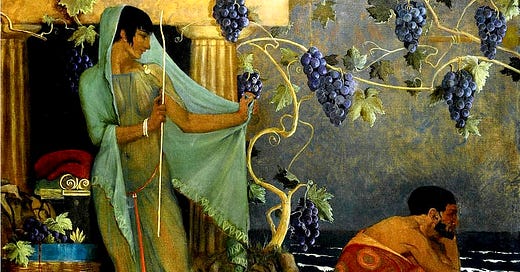When you picture paradise, you probably imagine something close to Calypso’s island: a sun-drenched shore, abundant fruit, and sweet wine that flows without end. There’s no work to be done, no sickness, and no fear of death — just comfort, peace, and pleasure.
This is precisely the scene Homer describes in Book 5 of The Odyssey, when he finally gives readers their first glimpse of the epic poem’s eponymous hero. But far from showcasing paradise, Homer paints a startling image: he doesn’t reveal Odysseus feasting with immortals, but crying alone on a beach.
For the past seven years, Odysseus has been stranded on Calypso’s island, partaking in all its paradisiacal pleasures — from food to drink to regular intimacy with a seductive goddess. Yet day after day, he now walks the island’s shore, looks across the waves, and longs for his home of Ithaca. He longs for his aging and mortal wife. For the life he once had.
The question is, why?
Why would any man choose to reject eternal youth, divine comfort, and limitless pleasure? Why would he abandon paradise for danger over safety, struggle over peace, and death over immortality?
Odysseus’s refusal of eternal life and his escape from Calypso’s island hold a mirror up to our deepest desires. It’s an episode that forces you to confront the possibility that the very thing you call paradise might, in fact, be a cage — and that the good life can’t be found where you’ve been taught to look.
But more importantly, it reveals the key to understanding the true source of life’s meaning. It was true when Homer composed his poem millennia ago, and it remains true to this day — and it’s exactly what we’re going to explore in today’s article…
Keep reading with a 7-day free trial
Subscribe to The Culturist to keep reading this post and get 7 days of free access to the full post archives.





